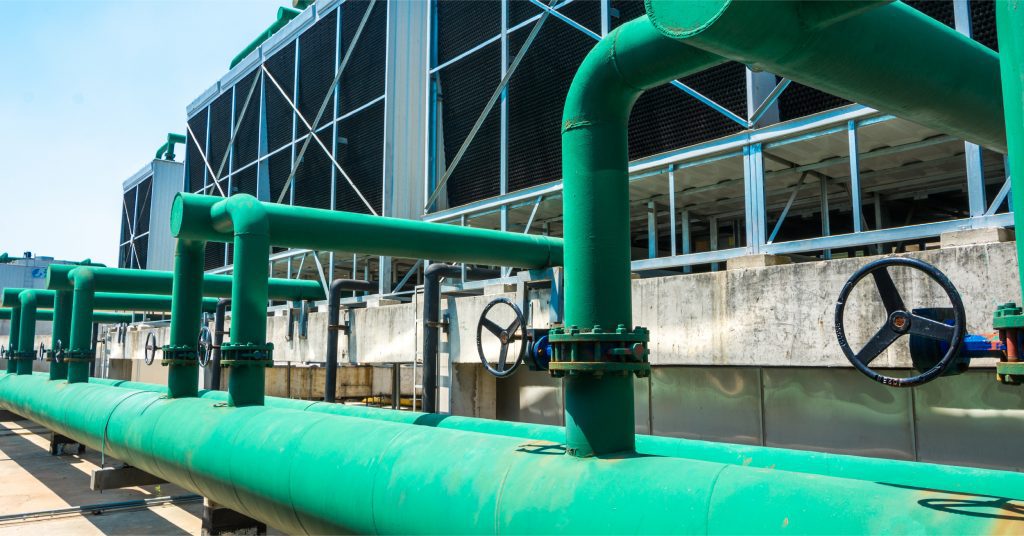In industrial operations across Indonesia, managing heat effectively is crucial for maintaining efficiency, ensuring safety, and reducing energy costs. One of the most effective tools for heat management is the cooling tower. These systems play a vital role in dissipating excess heat from industrial processes, allowing facilities to operate smoothly and sustainably.
This blog explores what a cooling tower is, how cooling tower works, and its significance in various industries in Indonesia.
What Is a Cooling Tower?
A cooling tower is a heat removal device that uses water and air to reduce the temperature of a process or building system. It dissipates unwanted heat from industrial equipment, processes, or HVAC systems into the atmosphere. By doing so, cooling towers maintain an optimal working environment for machinery and help prevent overheating, which could lead to costly downtime or equipment failure.
Cooling towers are commonly found in industries such as power generation, chemical manufacturing, oil refining, and food processing, making them an essential component of Indonesia’s industrial landscape.
How does the Cooling Tower work?
Cooling towers operate on the principle of heat exchange, where warm water from industrial processes is cooled by air. Here’s a step-by-step explanation of how a cooling tower works:
- Warm Water Collection
The process begins with warm water generated from industrial operations, such as heat exchangers, boilers, or condensers. This heated water is pumped into the cooling tower. - Water Distribution
Inside the cooling tower, the warm water is distributed over a large surface area, typically through spray nozzles, fill media, or splash bars. This maximizes the exposure of water to air. - Evaporative Cooling
As the water flows down the tower, air is drawn or forced upward, depending on the type of cooling tower. The interaction between water and air causes a small percentage of the water to evaporate, carrying away heat. This evaporative process significantly reduces the temperature of the remaining water. - Cool Water Collection
After cooling, the water is collected at the bottom of the cooling tower in a basin. This cooled water is then pumped back into the industrial system for reuse, completing the cycle. - Heat Release
The heat extracted from the water is released into the atmosphere as warm, moist air.
Why Are Cooling Towers Important in Indonesian Industries?
Cooling towers play a pivotal role in supporting Indonesia’s diverse industries. Here are some key reasons why they are indispensable:
- Enhanced Operational Efficiency
Cooling towers prevent overheating of industrial equipment, ensuring smooth and uninterrupted operations. - Energy Savings
By reducing the temperature of process water, cooling towers optimize energy consumption, lowering operational costs. - Environmental Benefits
Modern cooling towers incorporate sustainable practices by reducing water wastage and recycling cooled water, aligning with Indonesia’s growing emphasis on environmental responsibility. - Safety Assurance
Overheating can lead to dangerous situations, including equipment failures and accidents. Cooling towers mitigate these risks, ensuring a safe working environment. - Adaptability
Cooling towers are highly versatile and can be customized to meet the specific needs of industries operating in Indonesia’s tropical climate.
Advancements in Cooling Tower Technology
Indonesia’s industries are increasingly adopting advanced cooling tower technologies to enhance performance and sustainability. Innovations such as high-efficiency fill media, corrosion-resistant materials, and intelligent monitoring systems are transforming how cooling towers operate.
For instance, advanced monitoring systems provide real-time data on water flow, temperature, and performance metrics, allowing industries to optimize cooling tower operations and detect issues early. Additionally, the use of hybrid cooling towers that combine wet and dry cooling methods is gaining popularity, offering improved water efficiency in regions facing water scarcity.
How Ion Exchange Ensures the Perfect Corrosion Inhibitor for Water Systems?
Ion Exchange provides a comprehensive range of specialty, customized chemical treatment programs, including corrosion inhibitors and volatile corrosion inhibitors, specifically designed for optimal plant performance. Our corrosion inhibitor water treatment solutions are tailored to your system’s unique needs, utilizing advanced corrosion inhibitor chemicals to protect critical infrastructure. Whether it’s a cooling tower corrosion inhibitor or a corrosion inhibitor for water applications, our highly trained engineers conduct thorough plant surveys and closely monitor and adjust the treatment programs to ensure maximum effectiveness and long-term protection.
Refinery Process Chemicals
Refinery Process Chemicals such as IONREF 3804 for general corrosion protection and IONREF 3811 for amine units, are essential in preventing equipment damage and ensuring efficient, uninterrupted refinery operations.
INDION Boiler Water Treatment
Ion Exchange’s extensive boiler water treatment programs cater to low-, medium, and high-pressure boilers, ensuring the prevention of deposits and corrosion throughout pre-boiler, boiler, and post-boiler systems. Our DEHA-based oxygen scavengers deliver exceptional protection against corrosion, even within condensate lines.
INDION Cooling Water Treatment
Ion Exchange provides an extensive range of environmentally friendly treatment programs for open recirculating cooling water systems. INDION corrosion and scale inhibitors effectively manage corrosion, scaling, and fouling across various water quality conditions and system requirements.
INDION Fireside Treatment
It offers energy-efficient fuel additives essential for the effective treatment of any combustion system.
INDIFLOC Flocculants
This flocculant is suitable for various applications, including raw water treatment, papermaking, steel, and many more.
INDION Easytest Kits
These kits are specifically designed for on-the-spot analysis of make-up water, boiler water, and cooling water, making them user-friendly without requiring a trained chemist.
INDION Antiscalants & Membrane Cleaning Chemicals
These products are designed to eliminate scaling and fouling of reverse osmosis membranes, disperse suspended solids and colloids, and remove biofouling, organics, metal oxides/hydroxides, and other colloidal or particulate-based foulants.
Conclusion
Cooling towers are indispensable in managing heat for industrial processes across Indonesia. By understanding what a cooling tower is and how a cooling tower works, industries can make informed decisions about optimizing their heat management systems. The benefits of cooling towers extend beyond operational efficiency, contributing to energy savings, environmental sustainability, and workplace safety.


